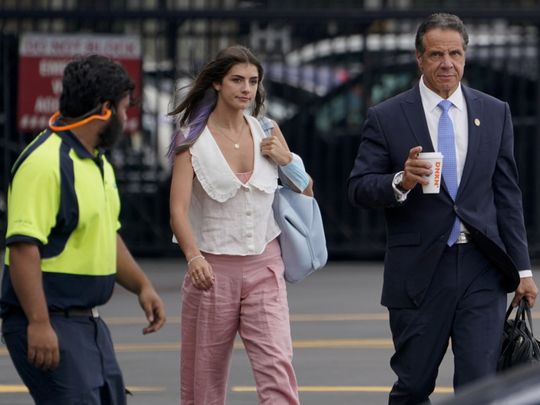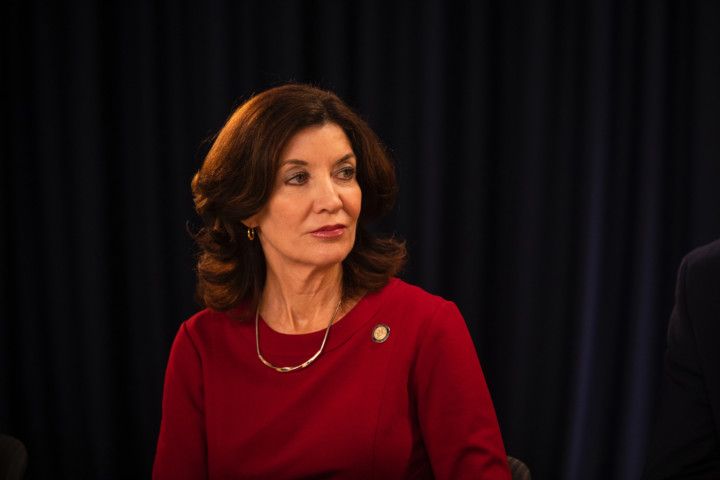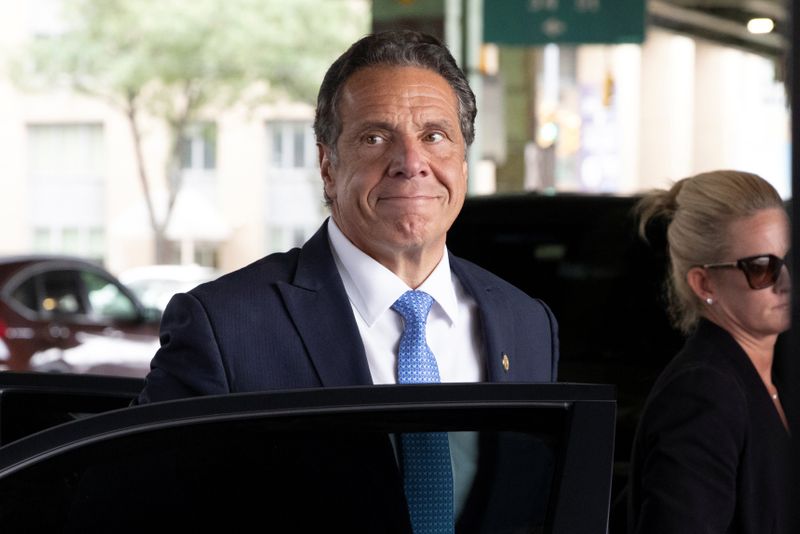
NEW YORK: Governor Andrew Cuomo announced his resignation on Tuesday over a barrage of sexual harassment allegations in a fall from grace a year after he was widely hailed nationally for his detailed daily briefings and leadership during some of the darkest days of the COVID-19 pandemic.
In a televised address, the 63-year-old Democrat emphatically denied intentionally showing any disrespect toward women but said that fighting back against what he called the “politically motivated’’ attack on him would subject the state to months of turmoil, and “I cannot be the cause of that.’’
“The best way I can help now is if I step aside and let government get back to government,’’ Cuomo said.
The three-term Democratic governor’s decision, which will take effect in two weeks, was announced as momentum built in the Legislature to remove him by impeachment. It came after New York’s attorney general released the results of an investigation that found Cuomo sexually harassed at least 11 women.
Investigators said he subjected women to unwanted kisses or otherwise touched them inappropriately” made insinuating remarks about their looks and their sex lives” and created a work environment “rife with fear and intimidation.’’

Lt. Governor Kathy Hochul, a 62-year-old Democrat and former member of Congress from the Buffalo area, will become the state’s 57th governor and the first woman to hold the post.
“I agree with Governor Cuomo’s decision to step down. It is the right thing to do and in the best interest of New Yorkers,” Hochul tweeted.
The #MeToo-era scandal cut short not just a career but a dynasty: Cuomo’s father, Mario Cuomo, was governor in the 1980s and ‘90s, and the younger Cuomo was often mentioned as a potential candidate for president, an office his father famously contemplated seeking. Even as the scandal mushroomed, Cuomo was planning to run for reelection in 2022.
Cuomo still faces the possibility of criminal charges, with a number of prosecutors around the state moving to investigate him.
The string of accusations that spelled the governor’s downfall began to unfold in news reports last December and went on for months.
Cuomo called some of the allegations fabricated, forcefully denying he touched anyone inappropriately. But he acknowledged making some aides uncomfortable with comments he said he intended as playful, and he apologized for some of his behavior.
He portrayed some of the encounters as misunderstandings attributable to “generational or cultural’’ differences, a reference in part to his upbringing in an affectionate Italian American family.
As a defiant Cuomo clung to office, state lawmakers launched an impeachment investigation, and nearly the entire Democratic establishment in New York deserted him — not only over the accusations, but also because of the discovery that his administration had concealed thousands of COVID-19 deaths among nursing home patients.
The harassment investigation ordered up by the attorney general and conducted by two outside lawyers corroborated the women’s accounts and added lurid new ones. The release of the report left the governor more isolated than ever, with some of his most loyal supporters abandoning him and President Joe Biden joining those calling on him to resign.
His accusers included an aide who said Cuomo groped her breast at the governor’s mansion. Investigators also said the governor’s staff retaliated against one of his accusers by leaking confidential personnel files about her.

A graduate of Fordham University and Albany Law School, Cuomo served as federal housing secretary in the Clinton administration in the late 1990s.
In 2002, however, he returned to New York to mount an unsuccessful bid for governor, dropping out of the race when it became clear he would not win his party’s nomination - an episode that Cuomo has described as one of the lowest points of his political career.
Intent on making a comeback, Cuomo was elected state attorney general in 2006. He wielded the power of the office not only to bring cases to protect consumers and expose a pay-to-play scheme involving millions of dollars of the state’s public pension funds, but also to launch damaging investigations into two governors. Cuomo investigated Spitzer’s administration’s handling of State Police travel records and conducted initial reviews into two matters concerning Governor David Paterson, who bowed out from the governor’s race in 2010, paving the way for Cuomo’s run.
Cuomo defeated his Republican opponent, Carl P. Paladino, by a landslide in 2010, vowing to bring fiscal discipline to Albany after the Great Recession decimated state coffers.
A pragmatic politician and shrewd operator, Cuomo navigated a divided state Legislature, reaching compromises to clinch high-profile victories such as the legalization of same-sex marriage and more stringent gun-control laws.
He also spearheaded a slew of important infrastructure projects statewide and helped secure a $15 minimum wage and paid family leave.
Even though he was elected on a promise to root out public corruption, Cuomo was dogged by a series of high-profile investigations into his administration and his close associates.
In 2014, Cuomo drew immense scrutiny for interfering with and abruptly closing the Moreland Commission, an anti-corruption panel. Federal prosecutors investigated the matter but concluded there was insufficient evidence to bring charges. In 2016, one of his top advisers and closest friends, Joseph Percoco, was indicted as part of a bribery investigation into the Buffalo Billion, an economic development project. Percoco was convicted of federal corruption charges in 2018.
A moderate Democrat and fiscal centrist, Cuomo began to clash with Democratic lawmakers more intensely when the party regained full control of the state Legislature in 2018, fueled by a crop of younger, left-wing lawmakers pushing for progressive reforms.
The attorney general report centered on interviews with 11 women, including a state trooper and an employee of an energy company whose accounts of sexual harassment by Cuomo had not been previously disclosed.
Lindsey Boylan, a former administration official, was the first to come forward. In December, Boylan, 36, publicly accused the governor of sexual harassment in a series of remarks on Twitter. She did not elaborate on the conduct, and attention to the accusation, which Cuomo denied, seemed to fade.
In February, Boylan published a lengthy essay on Medium in which she detailed her claim, describing several unsettling episodes, including one that involved the governor giving her an unsolicited kiss at his Manhattan office.
A few days later, Charlotte Bennett, 25, a former aide to Cuomo, told The New York Times in a series of interviews that the governor had asked her invasive questions while she was working for him, including whether she was monogamous and whether she had sex with older men.
His image battered and political oblivion looming, Cuomo went so far as to apologize in March — a rarity in his decadelong tenure as governor - for remarks that he said might have veered into “unwanted flirtation.” But he denied touching anyone inappropriately, a stance that many elected Democrats found less believable with each new accusation.
The last such allegation came later that month when an unidentified executive assistant said Cuomo groped her at the executive mansion, where he lives, late last year. The woman, Brittany Commisso, publicly identified herself soon after the report’s release.
The weight of the report’s findings, combined with other accounts of how Cuomo’s executive office had been a difficult workplace for women, caused all but the staunchest of his defenders to abandon him, leaving the governor isolated and ultimately in an untenable, unwinnable struggle to maintain power. -- New York Times News Service
As governor, Cuomo touted himself as an example of a “progressive Democrat’’ who gets things done: Since taking office in 2011, he helped push through legislation that legalized gay marriage, began lifting the minimum wage to $15 and expanded paid family leave benefits. He also backed big infrastructure projects, including airport overhauls and construction of a new bridge over the Hudson River that he named after his father.
At the same time the behaviour that got him into trouble was going on, he was publicly championing the #MeToo movement and surrounding himself with women’s rights activists, signing into law sweeping new protections against sexual harassment and lengthening the statute of limitations in rape cases.
His national popularity soared during the harrowing spring of 2020, when New York became the epicentre of the nation’s coronavirus outbreak.
His tough-minded but empathetic response made for riveting television well beyond New York, and his stern warnings to people to stay home and wear masks stood in sharp contrast to President Donald Trump’s brush-off of the virus. His briefings won an international Emmy Award, and he went on to write a book on leadership in a crisis.
But even those accomplishments were soon tainted when it was learned that the state’s official count of nursing home deaths had excluded many patients who had been transferred to hospitals before they succumbed. A Cuomo aide acknowledged the administration feared the true numbers would be “used against us’’ by the Trump White House.
Also, Cuomo’s administration was fiercely criticized for forcing nursing homes to accept patients recovering from the virus.
The US Justice Department is investigating the state’s handling of data on nursing home deaths. In addition, the state attorney general is looking into whether Cuomo broke the law in using members of his staff to help write and promote his book, from which he stood to make more than $5 million.
The governor had also increasingly come under fire over his rough and sometimes vindictive treatment of fellow politicians and his own staff, with former aides telling stories of a brutal work environment.
Cuomo has been divorced since 2005 from the author and activist Kerry Kennedy, a member of the Kennedy family, and was romantically involved up until 2019 with TV lifestyle personality Sandra Lee. He has three adult daughters.
During his resignation speech, he directly addressed his daughters, saying: “I want them to know, from the bottom of my heart: I never did, and I never would, intentionally disrespect a woman or treat a woman differently than I would want them treated. Your dad made mistakes. And he apologized. And he learned from it. And that’s what life is all about.’’
He gained political experience early on as his father’s hard-nosed and often ruthless campaign manager, and went on to become New York attorney general and U.S. housing secretary under President Bill Clinton before getting elected governor in 2010.
New York has seen a string of high-level political figures brought down in disgrace in recent years.
Governor Eliot Spitzer resigned in 2008 in a call-girl scandal. Rep. Anthony Weiner went to prison for sexting with a 15-year-old girl. Attorney General Eric Schneiderman stepped down in 2018 after four women accused him of abuse. And the top two leaders in the Legislature were convicted of corruption.








